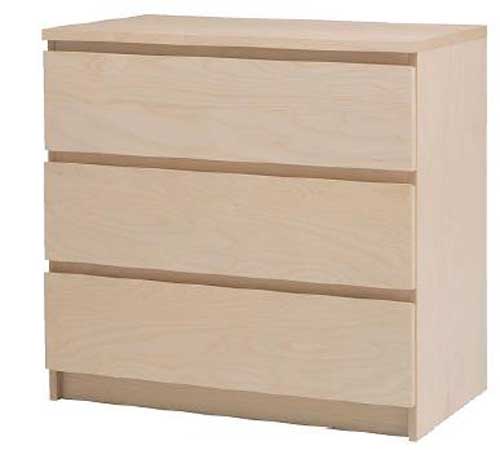A toddler from Minnesota has become the third child to die after an IKEA dresser tipped over and fell on top of him. Now the home furnishings giant and the U.S. Consumer Product Safety Commission have re-opened negotiations on how to address the hazard.
Last July, after two similar deaths were reported, the agency endorsed a corrective plan in which IKEA began offering free repair kits that would allow consumers to anchor the dressers to walls, so they wouldn’t topple if a child climbed on them. All three fatalities involved IKEA’s MALM-style dressers, of which an estimated 7 million are in U.S. homes and apartments. However, the company offered the repair kits for 27 million IKEA dressers it has sold in the U.S. in recent decades.
But with word of the third child fatality, consumer groups this week criticized the safety commission for accepting what they said was an inadequate remedy.
“To learn that a tipping IKEA MALM dresser killed yet another child, when the company and the CPSC chose not to do a recall after the first two deaths, is beyond heartbreaking – it is unacceptable,” the consumer groups wrote.
As reported in 2012 by FairWarning, tens of thousands of children have gone to hospital emergency rooms, and scores have died, from accidents involving tipped-over furniture and TV sets.
Theodore “Ted” McGee of Apple Valley, Minn., who was 22 months old, was crushed to death in February when a MALM dresser toppled over on him.
Since last July, IKEA says it has provided more than 300,000 free wall attachments kits to U.S. consumers, although IKEA notes that it has included such restraints with its chest of drawers for decades, and wall attachment is a key part of the assembly instructions.
Nonetheless, IKEA says it has told customers through emails, paid advertisements in parenting magazines, postings on its website, Facebook and Twitter, paid Internet searches and videos about the importance of wall attachment. The company says that message has been distributed more than 100 million times in the last year.
Even so, McGee’s parents were not aware of the tip-over risk or IKEA’s repair program, said their lawyer, Alan Feldman, in an email.
In a letter Tuesday to Elliot Kaye, chairman of the safety commission, representatives of the Consumer Federation of America, Consumers Union, the National Center for Health Research and Kids in Danger called on the agency to stop IKEA from selling the chests and dressers and give consumers the chance to return them for a full refund.
The letter from the four safety groups criticizes the commission for not using the term “recall” when the repair program was announced in July, noting that use of the term would draw a stronger consumer response.
The letter also suggests that IKEA dressers do not meet voluntary industry safety standards, which require drawers to be able to withstand 50-pounds of weight while open without causing the dresser to tip. “At less than 2 years old, it is unlikely the child in the most recent death weighed more than 50 pounds,” the letter states.
Kaye, the product safety commission chairman, released a statement Wednesday saying “more needs to be done” to protect children from furniture tip-overs.
“Without commenting on any specific case, companies are on notice that even if there has been a public announcement about a remedy to address a dangerous product, the company must take every possible step to prevent further harm,” he said. “This is especially the case when a child dies.”
IKEA also released a statement, saying the company is committed to educating consumers about the risk of tip-over accidents and preventing them.
“We believe that the best way to prevent tip-over of chests of drawers is to attach products to the wall with the included restraints and hardware per the assembly instructions,” the company said. “Regarding the recent tragic accident, we are having ongoing discussions with the CPSC staff on additional actions that we can take.”
Myron Levin contributed to this report.
FairWarning (www.fairwarning.org) is a nonprofit news organization based in Pasadena, Calif., that focuses on public health, safety and environmental issues





